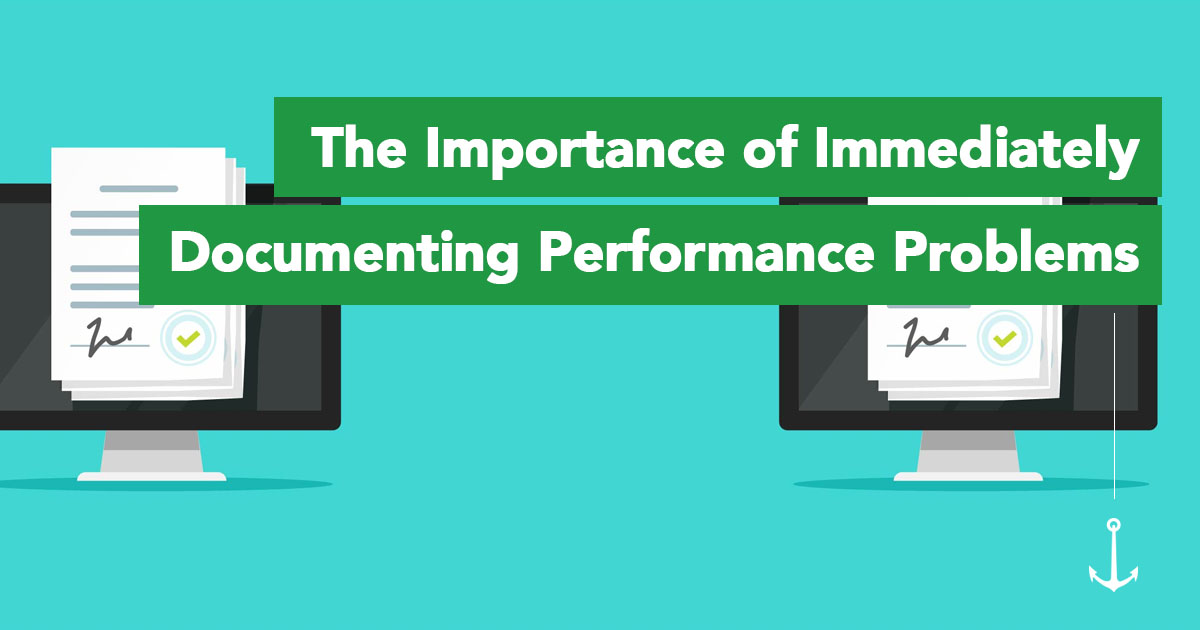| An exit interview is a conversation with a departing employee about their time at the company and the reason for their departure. It’s completely optional, but some employers conduct them to learn about workplace issues they may want to address. |
Topics: employers, documentation, interview
Question: What are some typical examples of employee discipline? Are there any you recommend?
Answer: Discipline should reflect the severity of the behavior, attempt to correct it, and be applied consistently. You’ll want to consider how you addressed certain behaviors in the past and the precedent you want to set for the future. For instance, if you jump straight to a final warning when a certain employee is an hour late to work, but let another employee come in late regularly without so much as a written warning, you’re setting yourself up for trouble.
Topics: documentation, discipline
The Importance of Immediately Documenting Performance Problems
The importance of documenting performance problems as they occur cannot be overstated. Although this requires meeting with the employee and discussing the issue, which will almost certainly be uncomfortable, it’s your best defense to a wrongful termination claim should the employee feel litigious after termination.
Too many employers rely on the concept of employment at-will to protect them, when the reach of this concept is actually quite limited. The problem is that if an employer has little to no documentation and relies on at-will employment—and the theory that legally no reason is required—the terminated employee, their attorney, and possibly a jury of their peers will fill the blank with an illegal reason. Although you may be within your rights to terminate “for no reason,” it’s a dangerous position to take.
Topics: teams, hr, documentation, termination, discipline
A staffing plan can help you determine the right number of people with the right set of skills to address your business needs. Staff planning is a systematic process that accounts for internal and external changes to help you meet your business objectives.
Topics: leadership, teams, employers, employees, hr, documentation
***Update: On September 14, DHS announced another 30-day extension of this temporary rule. The rule is now set to expire on November 19, 2020.
The physical presence requirement of the Employment Eligibility Verification, Form I-9, requires that employers, or an authorized representative, physically examine, in the employee’s physical presence, the unexpired document(s) the employee presents from the Lists of Acceptable Documents to complete the Documents fields in Form I-9’s Section 2.
Topics: covid, humancapitalmanagement, documentation
A federal court in New York recently struck down four federal Department of Labor rules related to the leaves provided by the Families First Coronavirus Response Act (FFCRA). As a result, certain aspects of the FFCRA are now more favorable to employees. Unfortunately, it’s not clear if the ruling applies nationwide or only in the Southern District of New York, where the court is located. Until there is further activity in the case—which may clarify whether the rules remain intact throughout the rest of the country—we recommend that employers err on the side of caution when administering FFCRA leaves and assume these particular rules no longer apply.
Topics: covid_19, covid, employees, hr, documentation
HR In Under Three Minutes: Documentation – The Magic Formula
We are going to talk for just a couple minutes about the magic formula for documentation. Why are we talking about documentation at all? Well, one of the most common questions we get is, “Can I terminate this employee?” The first thing we say in response is, “Do you have documentation of the poor performance or the behavioral issue?” Sometimes the answer is “yes,” often the answer is “no.”
It is really important that employers have documentation to back up their employment decisions. That documentation should have a few elements. So, let’s talk about those.
Topics: teams, collaboration, employers, employees, hr, documentation, termination









